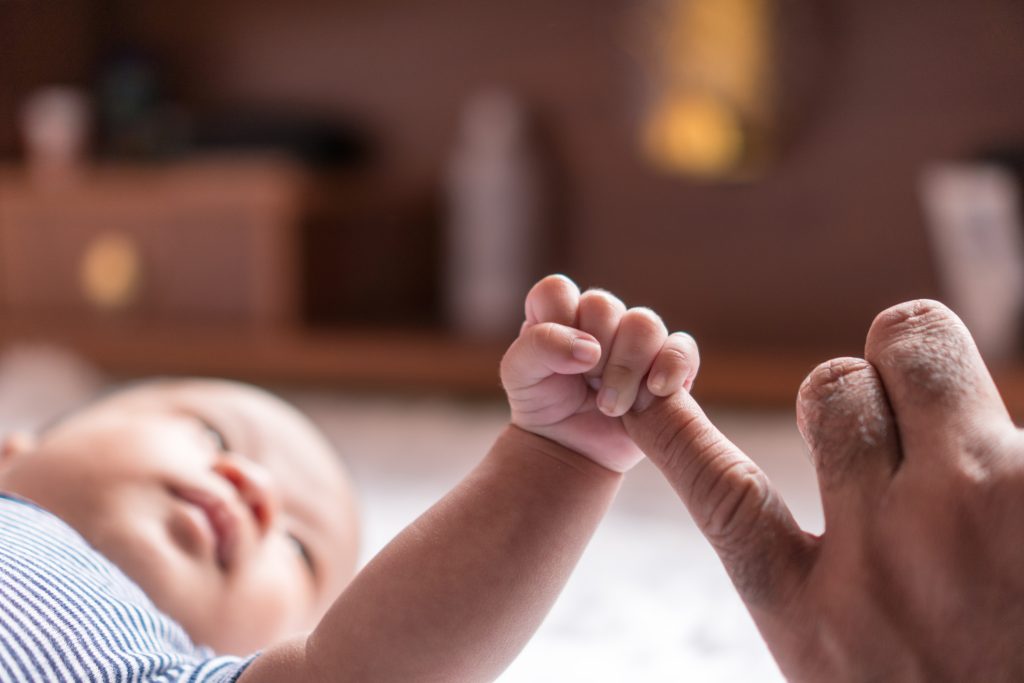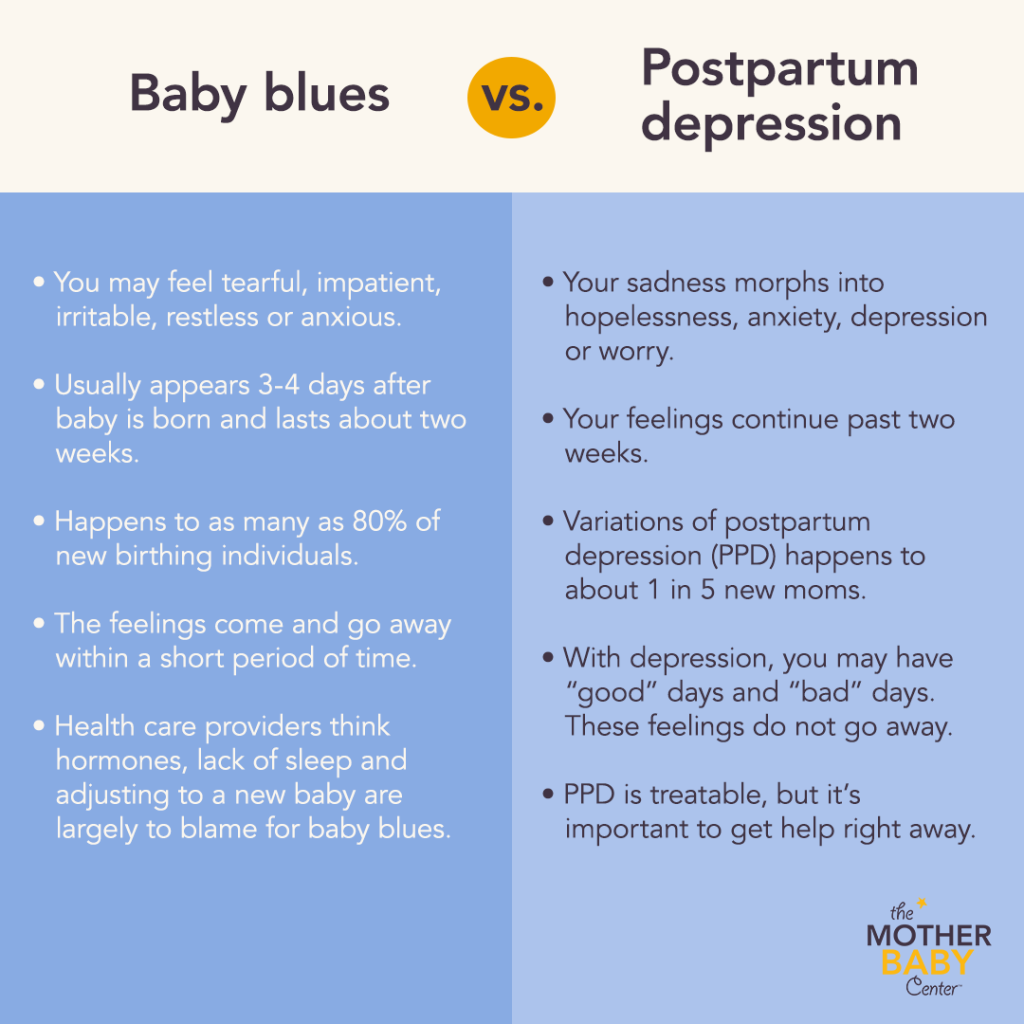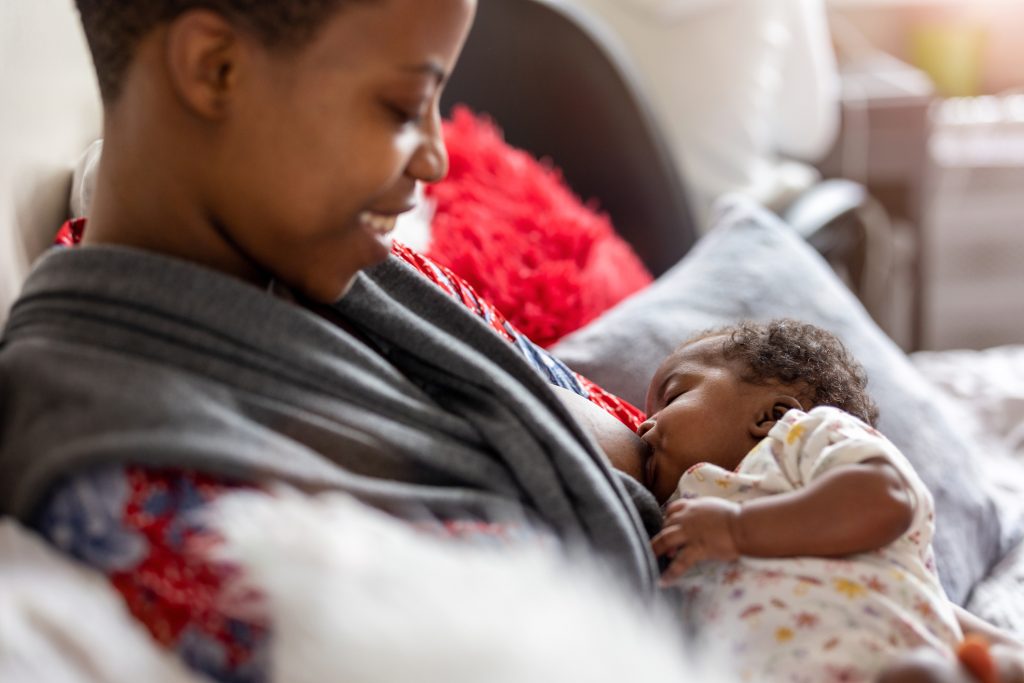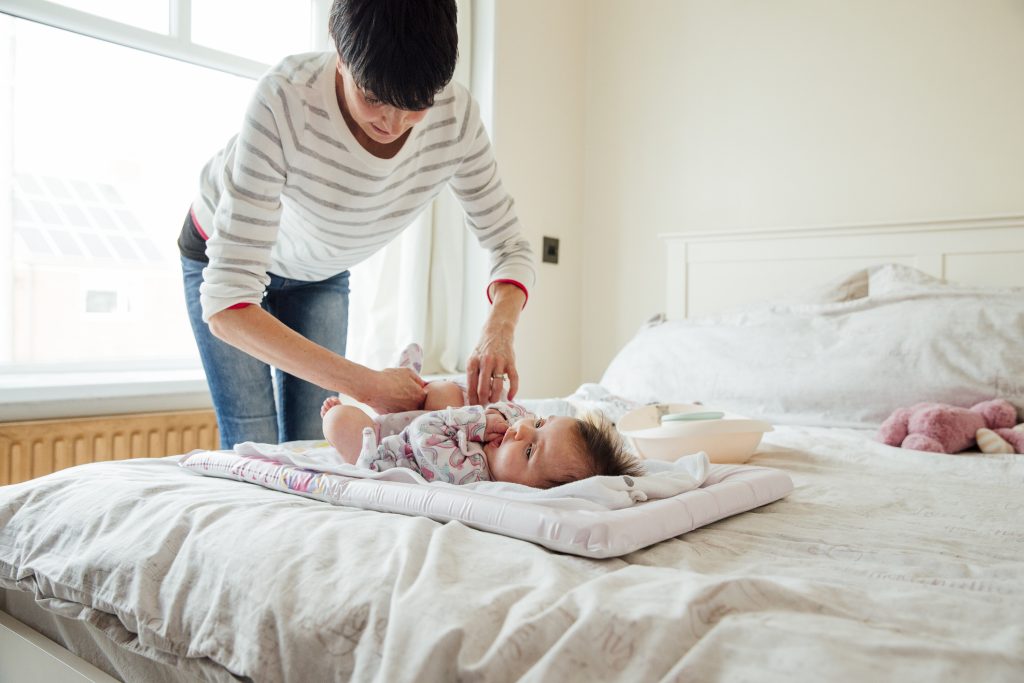The birth of a baby brings excitement and new challenges, especially as you may be recovering physically and settling into a new routine. We hope you embrace postpartum recovery with these insights on physical healing and emotional wellness, while also discovering holistic tips for a smoother journey.
The postpartum journey looks different for everyone. In this blog, you’ll learn about the duration of typical postpartum recovery after birth, common postpartum symptoms, strategies to help new parents cope and more.

Find postpartum support and services from The Mother Baby Center as you navigate parenthood.
How long is the postpartum recovery period?
The postpartum or “after birth” adjustment usually takes months – not weeks – for most new parents. From just days after delivery to a year later, you’ll experience changes.
Have you ever heard of the fourth trimester of pregnancy? This is the 12-week, three-month postpartum period immediately after you’ve given birth. But, your postpartum recovery period may be longer or shorter than this, it all depends. And, your journey may be different than what your friends and family members may have experienced. It’s a very personal journey.
Common postpartum recovery symptoms
Once you return home after birth, you may experience postpartum recovery symptoms. These are things like vaginal soreness, swollen feet after birth, hair loss or changes, mental health challenges and more. Sometimes, postpartum isn’t easy. Many people struggle with the permanent body changes after pregnancy that they experience. Don’t forget, we offer many resources to support you during this time.
Vaginal soreness
You may experience some postpartum soreness, especially in your vagina after giving birth. This is totally normal! You just delivered a baby, whether it was by C-section or vaginal delivery, it’s common to feel soreness, especially if you needed vaginal stitches after birth.
Bleeding and vaginal discharge
Postpartum bleeding and vaginal discharge after birth are also two common symptoms of a postpartum body. You may bleed for longer than you would guess, it can sometimes last up to 4-6 weeks after you give birth.
Sanitary pads can be helpful during this time; however, it is important to stop wearing them as soon as possible. Start at nighttime when you can not wear a pad or underwear. You can put a towel on the bed in case you have any spotting. This will help your body heal.

Discover support groups for new parents and partners through The Mother Baby Center.
Hair loss and skin changes
It is not uncommon to experience postpartum hair loss and skin changes after pregnancy. This is because your hormones are resetting and causing your hair to shed and your skin to react which may cause dry skin and breakouts. Both of these may last for a few months after pregnancy but should return to normal by your baby’s first birthday. You can try over-the-counter lotions and creams to help your skin feel softer.
Mental health changes
Postpartum health is extremely important to pay attention to, especially your mental health. In fact, about 8 in 10 women feel down after giving birth. And, 1 in 5 people experience postpartum depression.
This is because your body gave birth to a child and now new hormones are surging through your body. These hormones add to the stress, lack of sleep and simple joy that comes with a newborn; you can see how you may have a whirlwind of emotions. These hormones and emotions should level off in a week or two. If you have any concerns, please reach out to your provider or your baby’s provider to help support you.
Some additional tips:
- Eat some protein food (nuts, dairy, meat, beans) prior to going to sleep or taking a nap.
- When the baby sleeps, make it a priority for you to close your eyes, even if it’s just for 15 minutes.
- Make your priority the first two weeks to care for yourself and your baby.
- Ask your friends and families for help with other tasks, laundry, shopping, etc.
It’s also important to know the difference between the “baby blues” and postpartum depression.

Learn how The Mother Baby Center provides childbirth recovery support and care.
Weight changes
Many people’s weight fluctuates after giving birth, this is very normal. You likely gained weight during pregnancy, typically pregnant people gain 25-35 pounds during this time. It’s common to lose around 13 pounds after giving birth. You may feel like you want to get your body “back to normal” after having your baby which is normal, but make sure to talk with your care team before exercising after birth or changing your diet drastically.
It takes approximately 10 months to earn our mom bodies and it can take a year to return after birth. Remember our mom’s bodies are beautiful.
Incontinence
Many women experience leaking urine after childbirth, called incontinence. This can be involved in the recovery, especially the recovery from vaginal birth. It can happen randomly, or when you jump, sneeze or other quick movements. Incontinence usually only lasts for a few weeks, but for some women, it can last much longer. If you are losing urine, stool or gas please talk with your doctor or midwife.
After-birth pain or contractions
You may feel postpartum pain in your abdomen. These postpartum contractions are commonly called “afterpains.” Contractions after birth typically only last for a few days or weeks, then usually disappear. This simply happens because your uterus is contracting back to its normal size.
You can use Ibuprofen or Tylenol (take according to the recommended dosing on the bottle). You can also try warm baths or showers as these can help with the cramping.
Tender breasts
One of the postpartum pains you may feel is tender breasts. Your body is preparing to feed your new baby so it is increasing your breast milk production. You are also experiencing an increase in blood flow to your chest to help make milk. Both of these can cause tenderness to the breasts/chest.
Warm compresses, showers and cold cabbage leaves can help reduce the discomfort on your tender breasts. If you have a fever, redness, or pain that is getting worse please call your provider.
Explore The Mother Baby Center blog for answers to common questions many new parents have around breastfeeding and chestfeeding like, how long should you breastfeed to learn more about managing tender breasts.
Hemorrhoids and bowel movements
After birth many people can experience discomfort relating to hemorrhoids or bowel movements. Hemorrhoids are swollen veins in your rectum which can happen during pregnancy, and after you give birth during your postpartum journey. They can be itchy and painful and sometimes even cause bleeding during a bowel movement. Epsom salt baths and witch hazel tucks can help. They often resolve themselves but if the pain persists, we recommend talking to your provider.
Postpartum constipation is also relatively common after vaginal birth. There are many ways to help alleviate this discomfort such as medications, but it is important to ensure you’re maintaining a healthy diet as well. Be sure you’re drinking plenty of water. Also, make sure you are eating high fiber foods like, apples, pears, lentils, beans, green vegetables and whole grain foods.


Follow The Mother Baby Center on Facebook for the latest news and tips.
Understanding the postpartum recovery timeline
Each family and birth person requires time to heal and bond after delivery. As you and your body heal, you’ll go through different phases of the postpartum journey. You may experience some or all these feelings and symptoms, it just depends on each person.
Week one
Week one of your postpartum journey may be hard, especially the pain and soreness your body may be feeling. Here are the different physical and mental symptoms you may feel in week one:
- Vaginal pain: You will most likely experience pain and soreness in your vagina. It will also depend on how your delivery went and how you gave birth.
- Bleeding: In the first week, it is likely you will bleed vaginally for a while, whether you have postpartum stitches or not. This is completely normal. However, the bleeding should not be enough to fill or saturate a pad in one hour or less. If that happens, please call your provider.
- Contractions: You will likely feel some contractions, or after pains. This is normal and won’t last too long, likely ending before week two.
- Hormones: After giving birth, your hormones are changing to accommodate your new baby and the fact that you are no longer pregnant. You may experience quite a few emotions in the first week, especially as the exhaustion from labor and a new baby sets in.
Week two
Congratulations on making it to week two! We hope you are able to find somewhat of a rhythm with your new little one. Week two is not a ton different than week one other than getting used to the after-birth symptoms.
- Bleeding: Your bleeding is starting to slow down during this time. But in some cases, bleeding may continue. Both of these are normal.
- Tiredness: It’s normal to experience tiredness and exhaustion as the weeks continue after giving birth. Having a newborn can be a lot of work!
- Breastfeeding/chestfeeding: As your body adjusts to feeding a newborn and producing milk, this may cause some breast tenderness, nipple soreness, and leakage. All these are completely normal as you get used to feeding your baby – no matter how you do it!
Week three
By week three of postpartum, hopefully you’re beginning to feel more like yourself, which is exciting! But, your body is still healing, so be patient.
- Night sweats: If you had experienced night sweats in the first two weeks, they likely have subsided by the end of week three.
- Baby blues: You may still be experiencing a wide array of emotions during these weeks. You may still have a sad emotion one minute and then feel happy the next. This is normal. If your sad feelings continue past the third week, it may be postpartum depression. Please reach out to your provider.
- Movement: Ask your provider before moving forward with trying any exercise other than walking. You may not be ready for exercise or sex quite yet. If you have an increase in your bleeding, you might be doing too much activity.
Weeks four and five
Weeks four and five will be very similar to what you have experienced so far. See more for week six below.

Learn how The Mother Baby Center provides childbirth recovery support and care.
Week six
Congratulations, you reached week six of your postpartum journey! It’s likely you’ll have a checkup with your health care provider if you haven’t yet had one, to see how things are going. Here are some of the symptoms you might still be experiencing.
- Incision healing: If you had a C-section, your incision will most likely be healed, or almost healed, by week six.
- Hair loss: You may be experiencing some hair thinning or loss; this is normal because of hormone changes.
- Menstrual cycle: It is possible your menstrual cycle, or period, may have returned.
- Exercise and sex: During your checkup, based on how you are healing, your health care provider may clear you for some exercise and sex. Because of what your body has gone through, remember to take it slow.
Six months
You are now six months postpartum and we hope you are feeling like you are on the up-and-up! There still are some unique changes and differences in your body you may be experiencing.
- Emotions and feelings: You should feel like your mental health is back to what it used to be. If you are still feeling down and possibly depressed at this point, you should see a health care provider to discuss this.
- Weight: At six months postpartum, you may or may not be back to your pre-pregnancy weight, and that’s OK!
- Bleeding: Many people wonder about periods after pregnancy. Your hormones should have gone back to normal levels by now and your menstrual cycle may have started again.
One year
Congratulations, your baby is now a 1-year-old! You should be so proud of yourself! One year postpartum is a huge step in your journey. While many pieces of you may feel different, you should be almost fully back to yourself by one year.
- Mental health: How you’re doing with your mental health will now likely reflect how the adjustment to having a new baby is going, rather than the changes in emotions from pregnancy and birth.
- Pelvic floor: At a year postpartum, you shouldn’t be struggling with incontinence. However, if it is still a problem, we recommend talking to your health care provider. They may be able to provide support or recommend meeting with someone like a pelvic floor physical therapist to navigate your concerns.

Ensure your child’s health with a caring, and experienced physician, and find a provider today.
Strategies to cope with postpartum recovery
You may be wondering how you are supposed to cope with your postpartum journey. There are many ways to help manage this phase of your life. Find our advice below:
- Talking to others: Sit down with your friends or a family member and express how your postpartum experience is going, ask for advice or simple ideas to help you through whatever you are feeling and experiencing. They may be able to provide ideas you hadn’t thought of yet.
- Self-care: Prioritizing self-care is important for every new parent, especially the birth parent. You spent nine months growing the baby, now your baby is here and they take a lot of your attention, but don’t forget to pay attention to yourself too! Set up time to care for yourself like baths, reading time, quiet time, naps and more.
- Medications: If needed, talk with your health care provider about possibly taking medications to help relieve your postpartum symptoms, whether that would be for pain or mental health challenges.
When to seek additional support during postpartum recovery
As stated above, your postpartum experience is deeply personal. You may experience things your friends didn’t. It’s important to know when you may need additional support during this time such as medication, pelvic physical therapy to learn pelvic floor exercises or kegel exercises, friends and family to help with tasks around the house, or support groups. It is especially critical to seek support if you notice signs of infection or extreme discomfort.
Resources are not short in supply, try a friend or family member, or maybe you need to talk with your health care provider about what you’re feeling and experiencing. There are also support groups to meet with people experiencing something similar.
Find support for your family after delivery through The Mother Baby Center
Postpartum recovery and the postpartum period is an important time for your family but it is not without challenges. The excitement of your new little one brings so many emotions that can be intense to navigate on top of physically recovering from childbirth.
The Mother Baby Center is here for you and your family after your adorable little one is born, all the way through your postpartum journey. We offer support groups, tips for recovery, and additional postpartum care and services. We know that every family and every birth is unique which is why we deliver expert care through every stage.